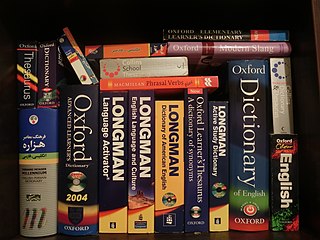
A dictionary, sometimes known as a wordbook, is a collection of words in one or more specific languages, often arranged alphabetically, which may include information on definitions, usage, etymologies, pronunciations, translation, etc. or a book of words in one language with their equivalents in another, sometimes known as a lexicon. It is a lexicographical reference that shows inter-relationships among the data.

The Surgeon of Crowthorne: A Tale of Murder, Madness and the Love of Words is a book by Simon Winchester that was first published in England in 1998. It was retitled The Professor and the Madman: A Tale of Murder, Insanity, and the Making of the Oxford English Dictionary in the United States and Canada.
Webster's Dictionary is any of the dictionaries edited by Noah Webster in the early nineteenth century, and numerous related or unrelated dictionaries that have adopted the Webster's name. "Webster's" has become a genericized trademark in the U.S. for dictionaries of the English language, and is widely used in English dictionary titles. Merriam-Webster is the corporate heir to Noah Webster's original works, which are in the public domain.
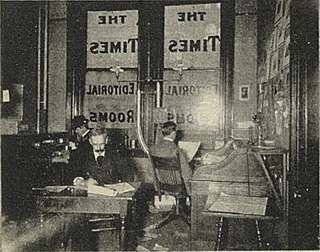
Editing is the process of selecting and preparing written, visual, audible, and film media used to convey information. The editing process can involve correction, condensation, organization, and many other modifications performed with an intention of producing a correct, consistent, accurate and complete work.
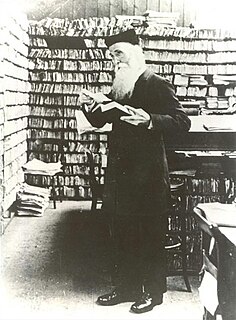
Sir James Augustus Henry Murray, FBA was a Scottish lexicographer and philologist. He was the primary editor of the Oxford English Dictionary (OED) from 1879 until his death.
Robert William Burchfield CNZM, CBE was a lexicographer, scholar, and writer, who edited the Oxford English Dictionary for thirty years to 1986, and was chief editor from 1971.
Robert Malcolm Ward Dixon is a Professor of Linguistics in the College of Arts, Society, and Education and The Cairns Institute, James Cook University, Queensland. He is also Deputy Director of The Language and Culture Research Centre at JCU. Doctor of Letters, he was awarded a prestigious Honorary Doctor of Letters Honoris Causa by JCU in 2018. Fellow of British Academy; Fellow of the Australian Academy of the Humanities, and Honorary member of the Linguistic Society of America, he is one of three living linguists to be specifically mentioned in The Concise Oxford Dictionary of Linguistics by P. H. Matthews.
A Latin Dictionary is a popular English-language lexicographical work of the Latin language, published by Harper and Brothers of New York in 1879 and printed simultaneously in the United Kingdom by Oxford University Press.
Edmund Weiner was co-editor of the Second Edition of the Oxford English Dictionary (1985–1989) and Deputy Chief Editor of the Oxford English Dictionary (1993–present). He originally joined the OED staff in 1977, becoming the dictionary's chief philologist.
A pronunciation respelling for English is a notation used to convey the pronunciation of words in the English language, which does not have a phonemic orthography.
Iona Margaret Balfour Opie, and Peter Mason Opie were an English married team of folklorists, who applied modern techniques to children's literature, summarised in their studies The Oxford Dictionary of Nursery Rhymes (1951) and The Lore and Language of Schoolchildren (1959). They were also noted anthologists, and assembled large collections of children's literature, toys, and games.
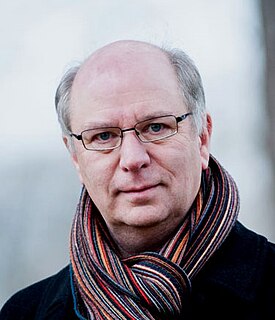
John Simpson is an English lexicographer and was Chief Editor of the Oxford English Dictionary (OED) from 1993 to 2013.
Patrick Hanks is an English lexicographer, corpus linguist, and onomastician. He has edited dictionaries of general language, as well as dictionaries of personal names.
Eugene Charles Ulrich is a U.S. doctor and the John A. O'Brien Professor of Hebrew Scripture and Theology in the Department of Theology at the University of Notre Dame. He is Chief Editor of the Biblical texts of the Dead Sea Scrolls and one of the three General Editors of the Scrolls International Publication Project. Ulrich has worked under two Editors in Chief on the Scrolls publication project, namely John Strugnell and Emanuel Tov.
Frederic Gomes Cassidy was a Professor of English at the University of Wisconsin-Madison, and founder of the Dictionary of American Regional English (DARE) where he was also the chief editor from 1962 until his death. He was an advocate for the Jamaican language and a pioneer of autonomous orthographies for creole languages.
Tamil Lexicon is a twelve-volume dictionary of the Tamil language. Published by the University of Madras, it is said to be the most comprehensive dictionary of the Tamil language to date. On the basis of several precursors, including Rottler's Tamil–English Dictionary, Winslow's Tamil–English Dictionary, and Pope's Compendious Tamil–English Dictionary, work on a more exhaustive dictionary began in January 1913 and the first forms were printed by the end of 1923. Initially estimated at ₹ 100,000, the total cost of the project came to about ₹ 410,000. The first edition had 4,351 pages in seven volumes, including a one-volume supplement, which were printed between 1924 and 1939 and had 104,405 words, with an additional 13,357 words in the supplementary volume, totaling to 124,405 words in all.
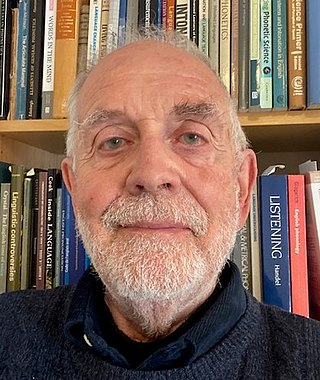
Peter John Roach is a British retired phonetician. He taught at the Universities of Leeds and Reading, and is best known for his work on the pronunciation of British English.








